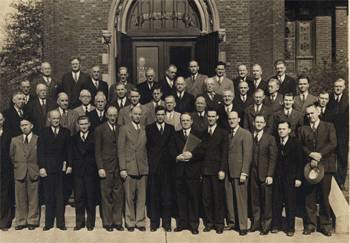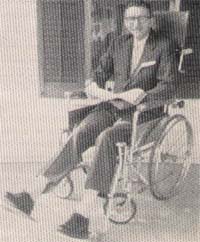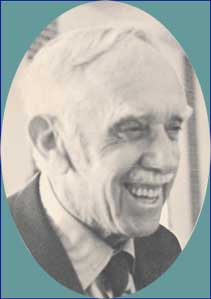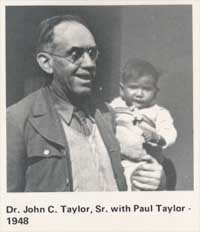On June 6 of this year, our post featured a look at the life and ministry of the Rev. Richard W. Gray, architect of the 1965 union of the Reformed Presbyterian Church, General Synod [1833-1965] and the Evangelical Presbyterian Church [1961-1965]. On the occasion of that union in 1965, Dr. Gray delivered the following sermon, titled:—
WHERE HAVE WE BEEN AND WHERE ARE WE GOING?
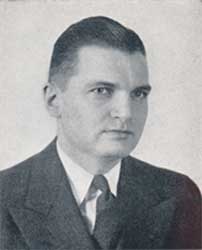 In 1936 I was a senior in Westminster Seminary about to launch upon a cause which, to me and many others, showed great promise. I had become acquainted with this cause at Wheaton College where, with Dr. Buswell as president, I learned something of the conflict and of the gathering storms in the Presbyterian Church in the USA. It was there I was introduced to the works of Machen and I heard him speak for the first time, and came to know some of the men of this assembly.
In 1936 I was a senior in Westminster Seminary about to launch upon a cause which, to me and many others, showed great promise. I had become acquainted with this cause at Wheaton College where, with Dr. Buswell as president, I learned something of the conflict and of the gathering storms in the Presbyterian Church in the USA. It was there I was introduced to the works of Machen and I heard him speak for the first time, and came to know some of the men of this assembly.
During my first two years of seminary there was the upheaval at Westminster when the policy of “no compromise” caused the resignation of the president of the board, Dr. Clarence McCartney, and of one of the original faculty members, Dr. O.T. Allis. It was while I was in seminary that I went with a number of students and sat in the lovely, colonial, historic sanctuary of the First Presbyterian Church of Trenton. On the platform were five or six men comprising the Judicial Commission of the Presbytery of New Jersey. I heard them read out five or six indictments against J. Gresham Machen and I saw him humbly but firmly, stand and plead on each one “not guilty.” Then I saw this trial of justice become a fiasco when they refused to permit doctrinal consideration and said the only issue at stake was whether or not Dr. Machen belonged to the Independent Board for Presbyterian Foreign Missions.
In 1936 I was preaching for one of the commissioners to the Syracuse Assembly of the Presbyterian Church in the USA when Dr. Machen, Dr. Buswell, Dr. Laird and others were having their cases reviewed by that Assembly, sitting as a judicial court. It upheld the convictions of these lower courts—in effect, defrocking these men, or at least removing them from the rolls of the Presbyterian Church in the USA.
Then, I sat on that day in June in the New Century Club in Philadelphia with a group of people known as the Presbyterian Constitutional Covenant Union. There the constituting act for the Presbyterian Church of America was adopted. There stepped to the platform the young professor of philosophy from the University of Pennsylvania, Gordon H. Clark, and in “Clarkian” style he took from his pocket two 8 1/2 x 11 pages and delivered a terse but brilliant nominating speech which made J. Gresham Machen moderator of the First General Assembly of the Presbyterian Church of America.
It was like standing upon a tower. There was a great vista before us. I felt as though I was a part of church history and in my bones were some of the great convictions of the Reformers and of the early Christians. But within one year I was to know something of the disillusionment and the discouragement that causes the Psalmist to cry out in the first three verses of Psalm 60. This initial group split and each side tagged the other with labels which it has taken about 25 years to wash off.
We went, some of us, to our local churches, working in store-fronts and in houses against the great odds which were now upon us, being labelled with every kind of name. In the course of two decades each of these groups broke again and we became known all over the country as “splinterers.”
“O God, thou hast cast us off.” I do not think I cried this out literally, but I am sure these were my feelings.
We had felt that the hand of God was on that movement when the Presbyterian Constitutional Covenant Union became the Presbyterian Church of America and Dr. Machen became its first Moderator. But now we felt like crying out: “O God, thou hast cast us off; thou hast scattered us, thou hast been displeased. Thou hast made the earth to tremble; thou hast broken it; heal the branches thereof; for it shaketh. Thou hast showed thy people hard things; thou hast made us to drink the wine of astonishment.”
Discouragement? Well, some of you may never known such discouragement as was experienced then. Vaguely there was still the sense of calling which is described in the next two verses, the calling and the prayer. “Thou hast given a banner to them that fear thee, that it may be displayed in the cause of truth. That thy beloved may be delivered; save with thy right hand, and hear me.” It was not much more than a gasp. Where was the banner with which we began?
Now a banner is a standard raised in warfare. We believed in 1936 that we belonged to the Church Militant. I want to say that we still belong to the Church Militant. The Lord Jesus Christ is not carrying on His work on this earth with tin soldiers. It is a life-and-death struggle.
I believe we are still in the warfare and we still have the same banner. The banner raised in the cause of truth was raised for the turth against compromise in ecclesiastical matters. We were standing for the purity of the visible church. We felt that the organized church had been instituted by our Lord Jesus Christ and it was not simply an association of convenience, or an organization that one joined because he wanted to get ahead, or even merely to give one the opportunity of preaching the gospel.
Also the banner of truth was raised against compromise culturally. We believed that Christianity was not only a fire escape from hell, so to speak, but it was a life-and-world view. We still believe this. We held this against the encroaching secularism of the day, against the deadening formalism of the church, and against the contaminating worldliness with which the church had become tainted.
Further, the banner of truth was raised against the compromise doctrinally. Many of us had come out of fundamentalism which united on five brief doctrines. We thanked God for that fundamentalism which stood in the gap and really brought us to a knowledge of Jesus Christ as our Lord and Saviour. But when we were introduced to the Westminster Standards, those documents which set forth the system of truth taught in the Word of God, we found something that satisfied our souls in depth. We felt that that also was a part of the standard and it was our calling to hold and raise this standard that God had given us—a banner for the cause of truth against compromise ecclesiastically, against compromise culturally, and against compromise doctrinally.
But you can well imagine that we did not exactly carry that banner with heads up. We were kind of disheveled looking after the reverses and the discouragements of 1937 and of the next decade. We would wait for the strange-looking stare that usually came and we wondered whether God had cast us off.
But then the encouragements began to come. As the Psalmist said, “God hath spoken in his holiness; I will rejoice.” I remember about ten years ago in the midst of some of these discouragements trying to convince myself that I could take a pulpit in the United Presbyterian Church about a year or two before the union with the Presbyterian Church USA, was to be consummated. It was a large pulpit and a rather influential one. I did my best to convince myself that I could take this. But somehow or other I could not quite give up on the calling that I felt God had given to me to raise this banner and to display it in the cause of truth.
I was still convinced, as I am sure many of you were, even though I did not feel it, that God had spoken in His Holiness and I clung to the promises by performances. Some encouragements began to appear. When I had a pastorate in southern Jersey just across the river from Wilmington I became acquainted with some of the brethren from whom I had been separated for ten or fifteen years. We began to work together on The Witness and the National Missions Reporter, which later became the Evangelical Presbyterian Reporter with basically the format of The Witness. That was an encouragement in the right direction.
Then the Columbus Synod occurred, and what was to be known as the Evangelical Presbyterian Church took form. Several men of that Synod went to Houston, Kentucky, to a little group known as The Reformed Presbyterian Church in North America. They said, “You know, we believe the same things you do. Cannot we get together?” I was not part of it then. They, too, had had their discouragements. Their difficulties had come before, and I think none of the older Reformed Presbyterian men would deny that discouragement had set in.
So now channels began to open. The next year some of us who had no ecclesiastical home and who had become somewhat discouraged and disillusioned, went to Coulterville, where we observed the Evangelical Presbyterian and Reformed Presbyterian Churches discussing union. It was only a year later that we were a part of the Reformed Presbyterian Church. And now, praise God, we are a part of the united church.
Although during the last five years there have been many dark days as far as this union is concerned, during the preceding 25 years there were even darker days, God gave His encouragement, we kept working and praying, and here we are.
I feel today the way I felt in 1936, when I thought I was about to launch upon a crusade with great promise. Before us at this synod there stretches the vista of large opportunity. It is the feeling one gets as he looks from the tower of Covenant College across vistas that include seven states.
But as we look out over this beautiful territory, we also see an enemy ensconced in his fortified city and we ask, “Who will bring me into the strong city, who will lead me into Edom?” You know, I think we can look at the strong city of Presbyterianism with the powerful enemy within its borders, and we can do so with a certain confident expectation regarding the future. A few weeks ago I received a phone call from a prominent conservative layman in the Presbyterian Church of the USA. He said, “I suppose you’ve seen the write-up in Time magazine about the change in the Creed. Last July I was in Princeton and I heard Dr. Dowey say the Westminster Confession of Faith was the death of theology.”
Then he made this statement to me: “You know 20 years ago they said to us that the conservative strategy should be one of co-existence and cooperation, but where has it gotten us?” I agreed that that would have been a great strategy if the hierarchy had “bought” it. The devil may allow the conservatives to win some tactical victories but certainly no strategic victories. He is certainly not surrendering the source of ministerial supply to any conservatives in that church or any other church if he can help it. Then he continued: “If you can do anything to arouse the conservatives in our denomination to reconsider this question I wish you would do it.”
In preparation for this Synod I wrote several men asking them to assess the situation in Presbyterianism today. A friend of mine who was a part of this movement in 1936 and now has one of the large Presbyterian pulpits in this country wrote. Listen to his note of discouragement. “Blake and Company are riding two horses. They speak of union with others, Episcopal, United Church, and so forth, but at the same time the unforgiveable sin is to buck the machine and not to be 100 percent Presbyterian. 100 percent Presbyterian means to give your all to the denominational program prepared by the professionals. At the same time they are making it easier for anyone to come under the flag of Presbyterianism by offering us a variety of creeds and statements. So you pay your money and take your choice. We can offer anybody anything in the way of a creed in our church. . .”
“The Presbyterian Church, North, is run by professionals who can make us poor preachers look silly when it comes to maneuvering. Note how they so slickly turned Pittsburgh Seminary from the one source of conservative-producing ministers to one of the most scholarly, radical institutions we have. Princeton is by far more conservative than Pittsburgh. They just faked us right out of our buildings.”
He is just utterly discouraged. He says, “I must admit I have not any positive thoughts about your united denomination. I can only point out the weaknesses of the situation in which I find myself, and hope they can be avoided.”
One of the leaders of the Southern Presbyterian Church wrote, “My statement to you uniting men would go along these lines. American Presbyterianism is in a state of sharp decline. The optimism of the late ’30’s over the revival of doctrinal consciousness due to the neo-orthodox movement has proved unfounded, for the rejection of Biblical infallibility by the Barthian group has had the inevitable effect of further unsettling the theological picture.
“The toboggan can be clearly seen in the north. It is not yet in evidence in the south, but a drift of increasing proportions may be easily detected. Conservatives in the southern church at this time are fighting only a holding action. They have the Presbyterian Journal as their rallying point and in this they are truly fortunate, but they lack a consistently conservative seminary which is a major and most lamentable weakness. They should be able to stave off efforts to effect union with the UP-USA body, for the constitutional requirement that mergers must receive an affirmative vote of 3/4ths of the Presbyteries is still adequate safeguard.
“There is a great need on the American scene for a sturdy, conservative Presbyterian denomination. The union of the EPC and the RPC is an important step in achieving this. If next the OPC can be brought to join forces, a truly impressive denomination would resutl. Numerically they would form a pretty good network of churches across the country. Separatist movements usually carry in themselves the seeds of further division as shown again in the days of 1936. The new denomination has learned these lessons it may be hoped.
“If the OPC should come along, too, there would be adequate number of experienced men with balanced judgment to keep the denomination on a sound course, one to encourage steady growth by local progress in attracting to the new church our Presbyterian groups seeking a happy spiritual home.
“To assist” (and I think this is a very important paragraph) “this last suggested development to occur the new denomination should follow a statesman-like policy toward the USA and the Southern church. They might well feel that their role in the south should be to testify without derogating. Criticisms that have to be made in faithfulness to Scripture could be offered in an evident spirit of loving concern, in sorrow not condemnation. It might be indicated that the line of separation that sometimes has to be drawn is often very difficult to decide upon, one man’s conscience not having received the same education as another’s, and Biblical interpretation on the issue of separation not standing out sharply and obviously clearly.”
So you see from these statements. and I think they are typical of the feelings of conservatives in the north and the south, that they are looking at us with somewhat envious eyes, and we must conduct ourselves with proper demeanor. If we ask humbly: “Who will bring me into the strong city? Who will lead me into Edom?” we will be able to reply: “Wilt not thou, O God, which hadst cast us off? and thou, O God, which didst not go out with our armies? Give us help from trouble, for vain is the help of man. Through God we shall gather strength: for he it is that shall tread down our enemies.”
I wonder what it was for which we were not prepared in 1936 that in the providence of God we may be prepared for in 1965 in order to seize the very same opportunity? I think we ought to ponder this question. One thing is that we must rely more upon the sovereign God. This reliance would cause us to carry on the battle in a different manner.
As one of the brethren of this Synod wrote me, “We should avoid the way in which we used to set forth the negative.” I was tremendously impressed by a statement in Phillips’ Your God Is Too Small in which he said that if you set forth the positive clearly and firmly and with conviction, the negative will automatically be there. But we must also exercise our responsibility, and whenever you hold to the Sovereignty of God, you are bound to hold to human responsibility.
If we are relying upon the sovereign God in prayer, then we are raising the banner in the great battle for the truth and exercising our responsibility. And I repeat that on this banner are these three distinctives: We must display the banner of truth against compromise ecclesiastically—standing for the purity of the visible church and yet paradoxically holding equally strongly to the communion of the saints which is fellowship with all believers, personally, individually, regardless of the organization ecclesiastically in which they find themselves.
We must display the banner of truth against compromise culturally, holding to the Christian life and world view, clinging tenaciously to the antithesis, while at the same time paradoxically utilizing Common Grace.
We must hold fast in our displaying of the banner of truth over against doctrinal compromise and I think this is our greatest need. Some of you other men feel the same, that we must cling to the system of truth set forth in the Westminster Standards. We are thanking God for the fundamentalism that brought us to Christ, but we are Presbyterians and we must hold to this system of truth which we believe is truly Scriptural and satisfying. It meets the enemy on many fronts.
At the same time we recognize that this system of truth has something in common with every other Christian system of truth as long as it holds to the infallibility of Holy Scripture and the supernatural doctrines of the Apostles’ Creed. We are Presbyterians in the providence of God and also by conviction. We must not be ashamed of this and if Infant Baptism is the only reason we are Presbyterians we are holding to Presbyterianism for a meager reason. The stronger reasons for being Presbyterian are for the teaching concerning the great doctrines of grace summarized in the five points of Calvinism, and the doctrine of the Covenant of Grace, as well as the Presbyterian form of government.
“Who will bring me into the strong city? Who will lead me into Edom the camp of the enemy? Wilt not thou, O God, which hadst cast us off, and thou, O God, which didst not go out with our armies? Give us help from trouble; for vain is the help of man. Through God we shall gather strength; for He is is that shall tread down our enemies.”

